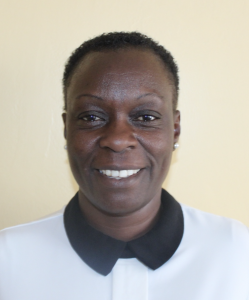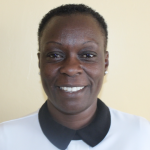July, 2020: COVID-19 Prevention Training Update at Emulakha Community, Nalianya Spring
Our teams are working on the frontlines of the COVID-19 pandemic. Join us in our fight against the virus while maintaining access to clean, reliable water.

Trainer Karen shows how to make a face mask
We are carrying out awareness and prevention trainings on the virus in every community we serve. Very often, our teams are the first (and only) to bring news and information of the virus to rural communities like Emulakha, Kenya.

Social distancing check
We trained more than 25 people on the symptoms, transmission routes, and prevention of COVID-19. Due to public gathering concerns, we worked with trusted community leaders to gather a select group of community members who would then relay the information learned to the rest of their family and friends.

How to put on a face mask using the one completed at training
We covered essential hygiene lessons:
- Demonstrations on how to build a simple handwashing station
- Proper handwashing technique
- The importance of using soap and clean water for handwashing
- Cleaning and disinfecting commonly touched surfaces including at the water point.

Practicing the 10 steps of handwashing
We covered COVID-19-specific guidance in line with national and international standards:
- Information on the symptoms and transmission routes of COVID-19
- What social distancing is and how to practice it
- How to cough into an elbow
- Alternative ways to greet people without handshakes, fist bumps, etc.
- How to make and properly wear a facemask.

Trainer Gladys demonstrates handwashing with a tippy tap station
During training, we installed a new handwashing station with soap near the community’s water point, along with a sign with reminders of what we covered.
Due to the rampant spread of misinformation about COVID-19, we also dedicated time to a question and answer session to help debunk rumors about the disease and provide extra information where needed.

Handwashing volunteer
Most participants said they did not know that if any of them shows Coronavirus symptoms, they can call a toll free number and wait for a government vehicle with health officials to come and pick them up to go get tested for Covid-19. They also said they did not realize that leaving home to go to the hospital on their own using public means would endanger those they come into close contact with on the roads, on bicycles, on the motorcycles, or in the vehicles.

Handwashing volunteer
We continue to stay in touch with this community as the pandemic progresses. We want to ensure their water point remains functional and their community stays informed about the virus.

Trainers stand with the prevention reminders chart they installed at the spring
Water access, sanitation, and hygiene are at the crux of disease prevention. You can directly support our work on the frontlines of COVID-19 prevention in all of the communities we serve while maintaining their access to safe, clean, and reliable water.

May, 2019: Emulakha Community, Nalianya Spring Project Complete
Emulakha Community is celebrating its new protected spring, so celebrate with them! Nalianya Spring has been transformed into a flowing, safe source of water thanks to your donation. The spring is protected from contamination, five sanitation platforms have been provided for the community, and training has been done on sanitation and hygiene.
Spring Protection
Construction at Nalianya Spring was successful and water is now flowing from the discharge pipe.
"At least our lives will be better with this protected water. Our school children who usually fetch water here can now smile. We thank God for this intervention," said Aisha Murayi.
The community members held a meeting to mark the completion and commissioning of the protected spring. The event was marked with prayer and thanksgiving. They are sure that the protected spring will greatly help to improve hygiene standards within the community, and hence improve their quality of life. They appreciate that the households will spend less time fetching water and spend more time on other economic activities.

The Process:
Community members provided all locally available construction materials, e.g bricks, clean sand, wheelbarrows of ballast, and gravel. Community members also hosted our artisans for the duration of construction.

The spring area was excavated with jembes, hoes, and spades to create space for setting the foundation of polyethylene, wire mesh, and concrete.
After the base had been set, both wing walls and the headwall were set in place using brickwork. The discharge pipe was fixed low in place through the headwall to direct the water from the reservoir to the drawing area.

As the wing walls and headwall cured, the stairs were set and ceramic tiles were fixed directly below the discharge pipe.

The ceramic tiles installed under the discharge pipe protect the concrete from the erosive force of the falling water and beautifies the spring. The process of plastering the headwall and wing walls on both sides reinforces the brickwork and prevents water from the reservoir from seeping through the walls and allows pressure to build in the collection box to push water up through the discharge pipe.
The concrete dried over the course of five days, during which a community member wetted the concrete to make sure it would dry without cracking. The source area was filled up with clean stones and sand and covered with a polyethylene membrane to eliminate any potential sources of contamination. After the backfilling was done at the reservoir area, the community members were already waiting and ready with poles and nails to help the artisan fence in the area. They have also planted grass around the spring box and cement catchment area to prevent erosion.
Sanitation Platforms
All five sanitation platforms have been installed and make wonderful, easy to clean latrine floors. These five families are happy about this milestone of having a latrine of their own. While some families have entirely finished their new latrines, others still need to build a superstructure. We will continue to encourage them to finish building walls and roofs over their new latrine floors as we visit for monitoring and evaluation.

New Knowledge
Our community contact presented the most convenient dates for us to hold hygiene and sanitation training, advising that we'd get the best turnout if we met in the morning. He also helped us recruit participants by going door to door inviting the families who use Nalianya Spring.
The attendees were all so active, but especially the men. They would speak up a lot about each and every topic, asking clarifying questions when they didn't understand.

Participants learned about:
– Leadership and governance for the spring committee
– Management and maintenance of the spring

– Family planning
– Personal hygiene, including handwashing
The facilitator began by asking the participants if they clean their hands. He requested a volunteer to illustrate how they wash their hands. A female participant volunteered and came up front. After she was done, the facilitator then demonstrated the proper way to wash hands, using the ten handwashing steps. Participants repeated each step as he went along. We also learned that nobody uses soap when they wash their hands, so the facilitator talked about its importance.

After the facilitator showed everyone how to build a leaky tin handwashing station, one older traditional man stood up and said that it is his wife's task to ensure that the leaky tins are always filled. Everyone burst into laughter when the facilitator challenged him on that: What would he do in case his wife went on a journey and the water ran out? The man bowed his head down at this point while the trainer urged the man to help his wife so they could all live a healthy, happy life.
– Dental hygiene
– Waterborne and water-related disease, along with water treatment methods
Both handwashing and toothbrushing are new concepts for this group of people, so the facilitator plans to check progress during each monitoring visit in the future.
"We thank the organization for finding time to come and give us this long-awaited knowledge," said Mr. Kweyu.
Thank You for making all of this possible!


 Protected Spring
Protected Spring
 Rehabilitation Project
Rehabilitation Project








































